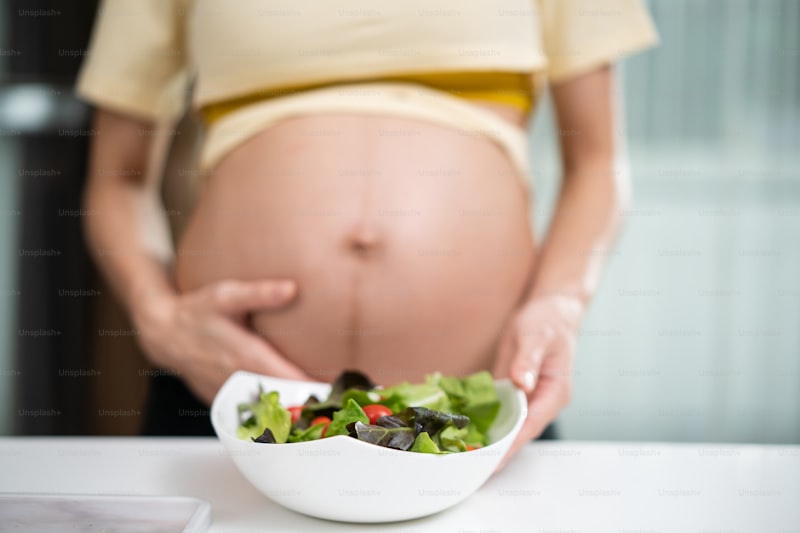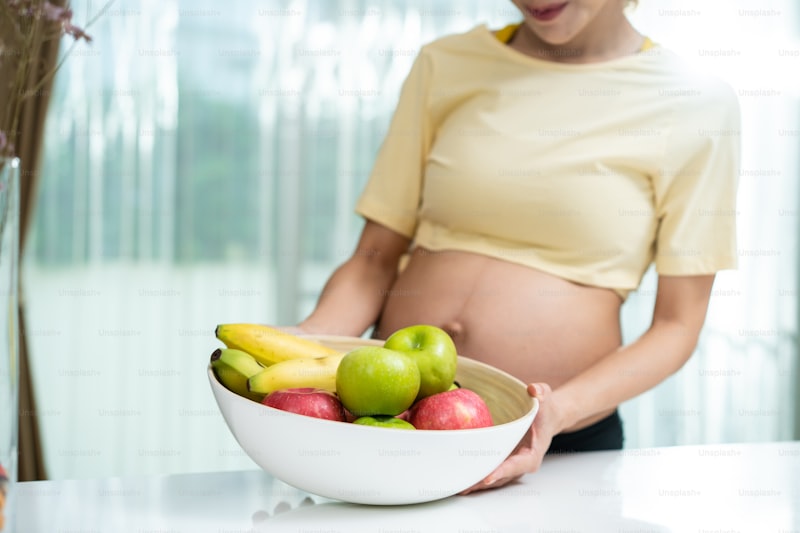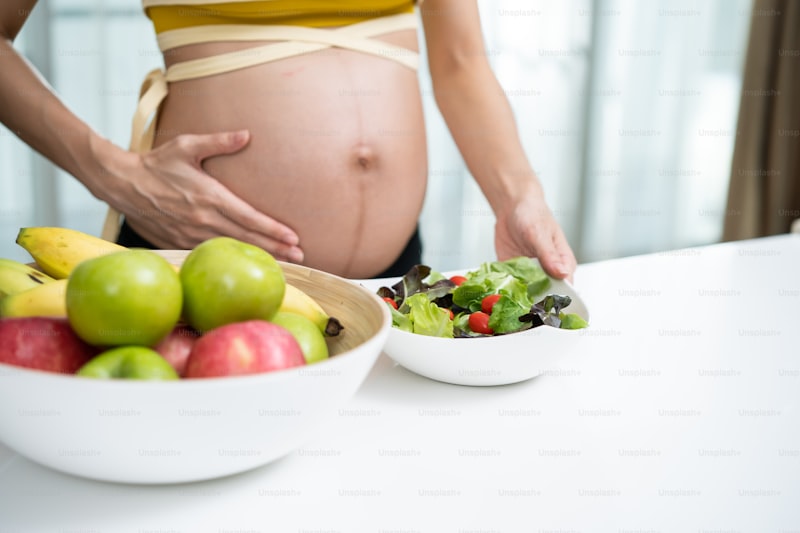When planning meals during pregnancy, focus on a balanced diet that includes a variety of foods rich in essential nutrients. Fresh fruits and vegetables provide vitamins, minerals, and fiber necessary for overall health. They also add color and flavor to meals, making them more enjoyable.
Proteins are essential for the growth of fetal tissues and can be found in lean meats, poultry, fish, eggs, beans, and nuts. Incorporating these into meals ensures an adequate intake of amino acids crucial for both mother and baby.
Whole grains like brown rice, whole wheat bread, and oats are excellent sources of complex carbohydrates. They provide sustained energy levels and essential nutrients such as B vitamins and fiber, which aids digestion—a common concern during pregnancy.
Calcium is vital for bone and teeth development in the baby. Dairy products like milk, cheese, and yogurt are excellent sources, but if you’re lactose intolerant or vegan, consider fortified plant-based alternatives like almond milk or tofu.
Healthy fats found in avocados, nuts, seeds, and olive oil are crucial for brain development and absorbing fat-soluble vitamins. However, moderation is key due to their high calorie content.
Avoiding processed foods, sugary snacks, and excessive caffeine is advisable during pregnancy. These can lead to unnecessary weight gain and may not provide the essential nutrients needed for both you and your baby.
Remember, staying hydrated is equally important. Drinking plenty of water helps maintain amniotic fluid levels, supports the increase in blood volume, and aids digestion.
In essence, prioritizing a balanced and varied diet ensures that you and your baby receive the necessary nutrients for a healthy pregnancy journey. By making thoughtful food choices, you can nurture both your own well-being and that of your growing baby.
Nourishing Two: Essential Nutrients for a Healthy Pregnancy Diet
During pregnancy, maintaining a nutritious diet isn’t just essential for the mother’s health but also for the development and well-being of the growing baby. Ensuring adequate intake of key nutrients can significantly impact both maternal and fetal health. Two vital nutrients that play a crucial role in a healthy pregnancy diet are iron and folate.
Iron is pivotal as it helps in the production of hemoglobin, which carries oxygen to the body’s cells, including those of the developing fetus. Pregnant women require more iron to support the increase in blood volume and to prevent iron deficiency anemia. Good sources of iron include lean red meat, poultry, fish, beans, and fortified cereals. Pairing iron-rich foods with vitamin C-rich foods enhances iron absorption, making it more available for the body to use.
Folate, also known as folic acid when taken as a supplement, is crucial in the early stages of pregnancy as it helps prevent neural tube defects such as spina bifida. It supports the rapid growth of the placenta and fetus and aids in the production of DNA. Leafy greens like spinach, citrus fruits, beans, and fortified grains are excellent sources of folate. Health experts often recommend women of childbearing age to consume adequate folate before conception and during early pregnancy to reduce the risk of birth defects.
Ensuring a balanced diet that includes these essential nutrients not only supports the mother’s health throughout pregnancy but also contributes to the healthy growth and development of the baby. Incorporating a variety of nutrient-dense foods ensures that both iron and folate requirements are met, promoting a healthy pregnancy from conception through delivery. Remember, every bite counts when nourishing both yourself and your growing baby.
The ABCs of Prenatal Nutrition: What Every Expectant Mother Should Know
Ensuring adequate nutrition is vital as it directly impacts the baby’s growth and development. Expectant mothers need a balanced diet rich in essential nutrients such as folate, iron, calcium, and protein. Folate, also known as folic acid, helps prevent neural tube defects in the baby. Iron supports the increased blood supply needed during pregnancy, while calcium aids in bone and teeth development.

A balanced diet during pregnancy includes a variety of foods from all food groups. It’s not just about eating for two but rather about making every calorie count with nutrient-dense choices. Lean proteins, whole grains, fruits, vegetables, and healthy fats should all be part of daily meals. This variety ensures that both mother and baby receive a spectrum of essential vitamins and minerals.
Pregnancy often brings about food cravings and aversions, which can make maintaining a balanced diet challenging. It’s important to listen to your body while ensuring that even indulgences are balanced with nutritious choices. Craving ice cream? Pair it with fresh fruit for added vitamins and fiber.
In addition to a healthy diet, prenatal vitamins are recommended to fill in any nutritional gaps. These usually include higher doses of folic acid and iron than typical multivitamins. Consulting with a healthcare provider about specific supplement needs is crucial as individual requirements can vary.
Staying hydrated is key during pregnancy as it helps maintain amniotic fluid levels, supports nutrient transport, and prevents constipation. Drinking plenty of water throughout the day is essential, especially as pregnancy progresses.
Alongside nutrition, regular exercise and ample rest contribute to a healthy pregnancy. Gentle activities like walking, swimming, or prenatal yoga can boost energy levels and promote better sleep, essential for both physical and mental well-being.
Understanding these ABCs of prenatal nutrition empowers expectant mothers to make informed choices that support their health and the development of their growing baby. By focusing on a balanced diet, hydration, supplements, and overall well-being, mothers-to-be can nurture a healthy pregnancy journey.
Superfoods for Super Moms: Boosting Pregnancy Health Through Diet

First on our list of superfoods for super moms are leafy greens like spinach, kale, and Swiss chard. These vibrant veggies are rich in folate, a crucial nutrient that supports the early development of your baby’s neural tube. Folate is also essential for preventing neural tube defects, making leafy greens a must-have on your plate.
Next up, we have berries—nature’s bite-sized superfoods. Whether it’s blueberries, strawberries, or raspberries, these little gems are packed with antioxidants that help protect your cells from damage. They’re also loaded with vitamin C, which aids in iron absorption—a vital mineral during pregnancy to prevent anemia and support your baby’s growth.
Let’s not forget about lean proteins such as chicken, fish, and legumes. Protein is the building block of life, and during pregnancy, your body needs extra protein to support the growth of your baby and placenta. Opt for lean options to keep your diet balanced and your energy levels up.
Whole grains like quinoa, oats, and brown rice are another superstar category. They provide essential fiber, B vitamins, and minerals like magnesium and zinc. Fiber helps prevent constipation—a common woe during pregnancy—while B vitamins support your baby’s brain development.
Avocados deserve a special mention in the superfood lineup. Creamy and delicious, they’re packed with healthy fats, fiber, folate, and potassium. These nutrients are not only beneficial for your baby’s development but also help keep you feeling full and satisfied.
Incorporating these superfoods into your daily meals can make a significant impact on your pregnancy journey. Remember, variety is key to ensuring you get a wide range of nutrients. So, mix and match these foods in creative ways to keep your meals exciting and nutritious. Your body—and your growing baby—will thank you for it!
Craving Control: Balancing Pregnancy Appetites for Health
Ever wondered why those cravings kick in? It’s not just about random urges; your body is smartly signaling what it needs. For example, craving citrus might mean you need more vitamin C, essential for your immune system and tissue repair. Similarly, a hankering for red meat could signify a need for more iron, crucial for carrying oxygen through your body.
But managing these cravings is where the challenge lies. Too much of certain foods could lead to excessive weight gain or nutrient imbalances, while ignoring cravings altogether might leave you feeling deprived or even nutrient-deficient. The key is finding a balance—a harmony between satisfying your cravings sensibly and nourishing your body with what it truly needs.
Take cravings for sweets, for instance. You might find yourself dreaming of chocolate cake or ice cream more often than usual. It’s okay to indulge occasionally, but opting for healthier alternatives like fresh fruits or yogurt can satisfy your sweet tooth without adding unnecessary sugar. This way, you’re not only fulfilling your craving but also providing your body with nutrients that support your health.
Another tip is to listen to your body’s hunger cues. Pregnancy can make you more hungry than usual, but it’s important to distinguish between true hunger and cravings triggered by emotions or boredom. Eating regular, balanced meals and snacks can help keep your hunger in check and prevent overindulgence in cravings.
Remember, pregnancy cravings are natural and can vary widely from person to person. Embrace this time as a journey where you learn to understand and nourish your body in new ways. By making mindful choices and listening to your body, you can navigate cravings while promoting your own health and that of your growing baby. So, enjoy the adventure of balancing pregnancy appetites—it’s a unique chapter in your life’s story!
From Bump to Baby: Crafting a Nutrient-Rich Pregnancy Meal Plan

A balanced meal plan during pregnancy should encompass a variety of nutrients, ensuring both maternal health and optimal fetal growth. Key nutrients such as folate, iron, calcium, and omega-3 fatty acids play crucial roles in fetal brain development, bone health, and overall well-being.
Foods rich in folate, like leafy greens, beans, and citrus fruits, help prevent neural tube defects in the baby. Iron is vital for red blood cell production and can be sourced from lean meats, beans, and fortified cereals. Calcium supports bone and teeth development, found in dairy products, tofu, and leafy greens. Omega-3 fatty acids, present in fish like salmon and walnuts, aid in brain and vision development.
A well-rounded pregnancy meal plan includes a variety of foods from all food groups. Lean proteins like poultry, fish, and legumes provide essential amino acids, while whole grains such as brown rice and whole wheat bread offer sustained energy and fiber. Colorful fruits and vegetables not only provide vitamins and minerals but also antioxidants that support the immune system.
Keeping meals frequent and portion sizes moderate helps manage energy levels and digestion. Snacks like yogurt with fruits or whole-grain crackers with nut butter can curb hunger while supplying essential nutrients. Staying hydrated with water and limiting caffeine intake are also crucial aspects of a healthy pregnancy diet.
Consulting with a healthcare provider or a registered dietitian ensures personalized guidance based on individual health needs and dietary preferences. By focusing on nutrient density and variety, crafting a nutrient-rich pregnancy meal plan supports both maternal health and the optimal growth and development of the baby.
Eating for Two: How to Manage Weight Gain Safely During Pregnancy
The key to managing weight gain during pregnancy lies in making informed and balanced choices. Nutrition plays a pivotal role in ensuring that both the mother and baby receive adequate nourishment. Instead of focusing on eating for two in terms of quantity, it’s more about eating wisely for two. This means choosing nutrient-dense foods that provide essential vitamins, minerals, and proteins necessary for fetal growth and maternal health.
Aim for a balanced diet that includes a variety of food groups such as fruits, vegetables, whole grains, lean proteins, and healthy fats. These foods not only provide essential nutrients but also contribute to steady weight gain. Incorporating foods rich in folate, calcium, iron, and omega-3 fatty acids can support the baby’s development and help manage weight gain.
Portion control is another important aspect of managing weight during pregnancy. While it’s normal to feel hungrier than usual, particularly in the later stages of pregnancy, listening to your body’s hunger cues and eating smaller, more frequent meals can prevent excessive weight gain. This approach helps in maintaining steady energy levels throughout the day and prevents overeating.

Staying physically active during pregnancy is beneficial for managing weight gain and maintaining overall health. Low-impact exercises such as walking, swimming, prenatal yoga, or modified aerobics can help strengthen muscles, improve circulation, and support healthy weight management.
Consulting with a healthcare provider is essential for personalized guidance on weight gain during pregnancy. They can monitor weight gain, provide dietary recommendations, and address any concerns or questions you may have. By focusing on nutritious eating, portion control, staying active, and seeking medical advice when needed, expectant mothers can manage weight gain safely and support a healthy pregnancy journey.
Folate Facts: Why It’s Crucial and Where to Find It in Your Diet
Folate, also known as vitamin B9, plays a crucial role in maintaining our overall health. But why exactly is folate so important, and where can you find it in your diet?

Firstly, folate is essential for cell division and growth, making it particularly important during periods of rapid cell division such as pregnancy and infancy. It helps in the production of DNA and RNA, which are the building blocks of cells. This means that folate is vital for the development and maintenance of tissues and organs throughout our lives.
One of the most well-known benefits of folate is its role in preventing neural tube defects in unborn babies when taken by pregnant women. It supports proper fetal development, especially in the early stages of pregnancy. Additionally, folate is crucial for the production of red blood cells, which are responsible for carrying oxygen throughout the body. This helps in preventing anemia and maintaining overall energy levels.
So, where can you find folate in your diet? Good sources include leafy green vegetables such as spinach and kale, legumes like beans and lentils, as well as citrus fruits and fortified cereals. Incorporating these foods into your meals can help ensure that you’re getting an adequate amount of folate to support your body’s needs.
Folate is a vital nutrient that supports overall health, from cell division to the prevention of birth defects. By including folate-rich foods in your diet, you can support your body’s functions and promote optimal health throughout all stages of life.
Frequently Asked Questions
How many extra calories should I consume while pregnant?
During pregnancy, it’s recommended to consume approximately 300 extra calories per day to support the growth and development of the baby. These additional calories help ensure proper nutrition for both the mother and the baby without leading to excessive weight gain. Consulting with a healthcare provider is essential to determine the specific dietary needs based on individual circumstances.
What are the essential nutrients for a healthy pregnancy diet?
Learn about the essential nutrients crucial for a healthy pregnancy diet, ensuring both maternal and fetal well-being.
How can I manage morning sickness through diet during pregnancy?
Discover effective dietary strategies to manage morning sickness during pregnancy. Learn about foods and habits that can alleviate symptoms and promote well-being.
Can I continue to exercise while maintaining a healthy pregnancy diet?
Yes, you can exercise safely while following a healthy pregnancy diet. Combining regular physical activity with nutritious eating supports both your health and your baby’s development. Consult your healthcare provider for personalized exercise guidelines that fit your pregnancy stage and health condition.
What foods should I avoid during pregnancy?
Discover what foods to avoid during pregnancy to ensure a healthy journey for you and your baby. Learn about the key dietary restrictions that can impact pregnancy.


